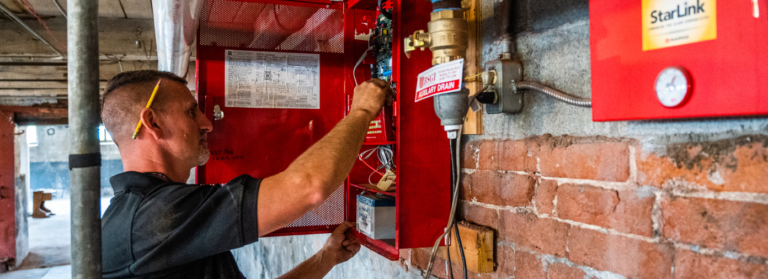1 – Heating Equipment
A third of office fires occur between 7pm and 7am, when buildings are least occupied. Commercial furnaces, radiators, or boilers can malfunction and overheat, which can result in a fire. This is particularly hazardous in industrial properties where flammable chemicals and other materials are easily ignited. Space heaters can also be fire hazards, especially during winter when they are heavily used.
PREVENTION TIP : Perform routine HVAC maintenance and service and install a life safety alarm system that is professionally monitored 24/7.
2 – Smoking
Although many businesses these days are smoke-free indoors, employees tossing cigarette butts on the ground may easily trigger a dangerous fire. Many fires are
the result of careless smoking habits, smoking in high-risk areas, and improper match/lighter/cigarette disposal.
PREVENTION TIP : Enforce designated smoking areas if your business permits smoking on premise. Provide appropriate disposal receptacles and check them routinely.

Call 610-775-1200 or complete the form below to discuss your facility’s life safety needs with a BSGI expert.
3 – Cooking
Grease fires are a hazard if your commercial building includes a kitchen. Most kitchen fires are the result of unattended cooking, especially when frying food. Oils, fats, and grease ignite when overheated, and flames can quickly spread beyond the pan.
PREVENTION TIP : Ensure employees remain in the kitchen area when cooking and be sure to clean crumbs and grease from ovens, stoves, and toaster ovens.
4 – Electrical Equipment
Overloaded circuits and electrical equipment are a hazard in any building. Almost 20% of warehouse fires are directly caused by electrical malfunctions. Too many things plugged into the same outlet or extension cord are truly a fire waiting to happen.
PREVENTION TIP : Perform routine maintenance and inspections to ensure OSHA guidelines for proper electrical cord use are carefully followed.
5 – Arson
Approximately 10% of office fires were intentionally set. An arsonist may start a fire anywhere, but bathrooms, trash cans, dumpsters, and garages are likely spots. These fires are often started at night, when fewer people are around.
PREVENTION TIP : While it may be hard to prevent an arsonist from setting a fire, ensuring that fire detection and suppression systems are in place can save lives and property.







